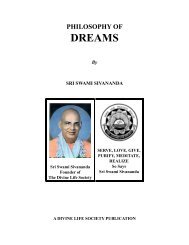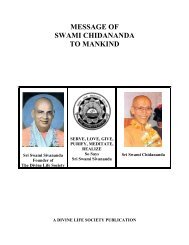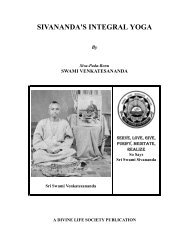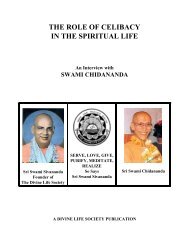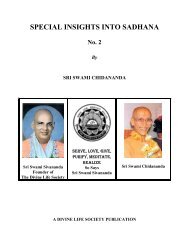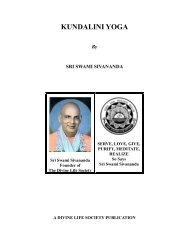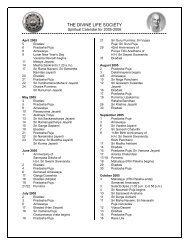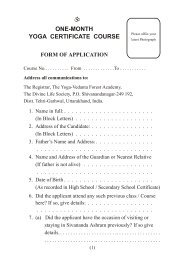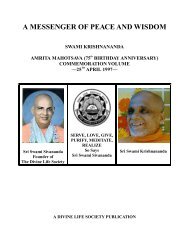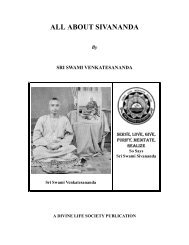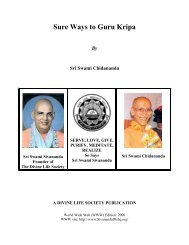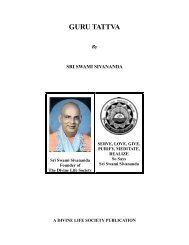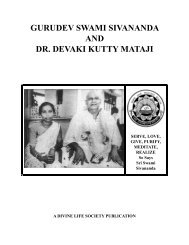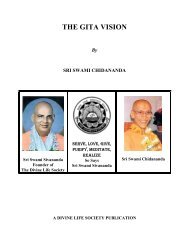Mind--Its Mysteries and Control - The Divine Life Society
Mind--Its Mysteries and Control - The Divine Life Society
Mind--Its Mysteries and Control - The Divine Life Society
Create successful ePaper yourself
Turn your PDF publications into a flip-book with our unique Google optimized e-Paper software.
MIND—ITS MYSTERIES AND CONTROL<br />
DEGREE OF CONSCIOUSNESS IN THE THREE STATES<br />
In sleep, some action or other is always going on in your mental or vital being; things<br />
happen there <strong>and</strong> they govern waking consciousness. For instance, some are very anxious to perfect<br />
themselves <strong>and</strong> make a great effort in this direction during the day. <strong>The</strong>y go to sleep <strong>and</strong> when they<br />
rise the next day, they find no trace of the gains of their previous day’s efforts; they have to traverse<br />
the same ground once again. This means that the effort, <strong>and</strong> whatever achievement there was,<br />
belonged to the mere superficial or wakeful parts of the being, but there were deeper <strong>and</strong> dormant<br />
parts that were not touched. In sleep, you fell into the grip of these unconscious regions <strong>and</strong> they<br />
opened <strong>and</strong> swallowed all that you had laboriously built up in your conscious hours.<br />
Be conscious. Be conscious of the night as well as of the day. First, you will have to get<br />
consciousness, afterwards control. Such of you as remember your dreams may have had this<br />
experience that sometimes, even while dreaming, you knew it was a dream; you knew that it was an<br />
experience that did not belong to the material world. Once you know, you can act there in the same<br />
way as in the material world. Even in the dreaming state, you can exercise your conscious will <strong>and</strong><br />
change the whole course of your dream experience. And, as you become more <strong>and</strong> more conscious,<br />
you will begin to have the same control over your being at night as you have during the daytime,<br />
perhaps even more. For, at night, you are free from slavery to the mechanism of the body. <strong>The</strong><br />
control over the processes of the body-consciousness is more difficult, since they are more rigid,<br />
less amenable to change than are the mental or the vital processes. At night, the mental <strong>and</strong> vital<br />
parts of your being, especially the vital ones, are very active. During the day, they are under check;<br />
the physical consciousness automatically replaces their free play <strong>and</strong> expression. In sleep, this<br />
check is removed <strong>and</strong> they come out with their natural <strong>and</strong> free movements.<br />
SUSHUPTI AND ADVAITA NISHTHA DISTINGUISHED<br />
In sleep, the mind is in a subtle state. <strong>The</strong> Vrittis have also assumed a subtle state. But, in<br />
Advaita (Vedantic) Nishtha, there is no mind. <strong>The</strong>re is no universe. <strong>The</strong> world sinks down in<br />
Brahman (Prapanchopasamam)—(Vide M<strong>and</strong>ukya Upanishad, II-1).<br />
THE SUPREME SELF IN THE THREE AVASTHAS<br />
<strong>The</strong> Supreme Self which has four forms, is inside the bodies of all living beings <strong>and</strong> is<br />
known by the names Visva, Taijasa, Prajna <strong>and</strong> Turiya. <strong>The</strong> seat of the Visva is the right eye; within<br />
the Manas dwells Taijasa, (Manasyantastu Taijasah —Gaudapada’s Karika on the M<strong>and</strong>ukya<br />
Upanishad), while Prajna resides in the ether of the heart. <strong>The</strong> objects of enjoyment are of three<br />
kinds—gross, subtle <strong>and</strong> bliss itself. Satisfaction is also threefold.<br />
Jagaritasthano Bahishprajnah Saptanga Ekonavimsatimukhah Sthulabhuk Vaisvanarah<br />
Prathamah Padah—<strong>The</strong> first foot of Omkara is Vaisvanara, whose region is the waking state, who<br />
has objective consciousness, who has seven limbs 1 <strong>and</strong> nineteen mouths 2 <strong>and</strong> who enjoys gross<br />
1 <strong>The</strong> seven limbs are: (i) Heaven (is His head), (ii) Sun (is His eye), (iii) Wind (is His breath), (iv) Akasa (is His<br />
waist), (v) Water (is His pelvis), (vi) Fire (is His mouth) <strong>and</strong> (vii) Earth (is His feet).<br />
2 <strong>The</strong> nineteen mouths are: Five Jnana-Indriyas, five karma-Indriyas, five Pranas <strong>and</strong> four Antahkaranas (Manas,<br />
Buddhi, Chitta <strong>and</strong> Ahankara).<br />
25



